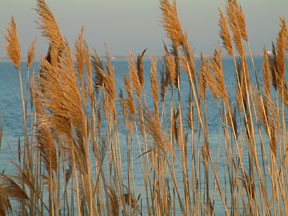With $1.1 million from Sea Grant, Cornell to study PCBs, lake invaders and more
By Krishna Ramanujan
Studies of bird songs could lead to new methods for detecting damaging levels of environmental contaminants. Better understanding of a potentially lethal pathogen in smoked fish may offer safer ways to cure fish. These are two of the five Cornell projects that New York Sea Grant has awarded research funding in 2009-10.
The grants total more than $1.1 million and include federal money from the National Oceanic and Atmospheric Administration administered through New York Sea Grant and contributions from Cornell, other private institutions and industries.
The Cornell projects are:
- Principal investigators Eric Nelson, professor of plant pathology and plant-microbe biology, and Bernd Blossey, natural resources, will explore the relationships between common reed (Phragmites australis) and soil pathogens. Common reed, an invasive plant in North American wetlands, may respond differently to soil pathogens than native species, allowing it to thrive. The research could provide insights for developing new management strategies. (Two-year grant total: $210,858)
- Cornell psychologist and neuroscientist Timothy DeVoogd and ornithologist Andre Dhondt will examine the effects of polychlorinated biphenyls (PCBs), an environmental contaminant, on singing behaviors in songbirds. Preliminary studies show that PCBs interfere with the development of brain systems involved in producing song. The studies could help researchers develop new methods for detecting dangerous but nonlethal PCB levels in the environment. (Two-year grant total: $104,570)
- Cornell aquatic animal medicine professor Paul Bowser, virologist James Casey and Bowser lab research associate Rodman Getchell will use new genetic tools and zebrafish infection studies to investigate the natural infectious cycle of the Great Lakes strain of viral hemorrhagic septicemia virus, an extremely serious fish virus for which no treatment exists. The researchers hope to better understand how the virus is transmitted, which could improve biosafety protocols and decontamination methods. (Two-year grant total: $299,569)
- Food scientists Martin Wiedmann and Teresa Bergholz will use genomics-based methods to identify effective combinations of growth inhibitors for the bacterial food contaminant Listeria monocytogenes on cold smoked salmon. L. monocytogenes causes a potentially severe foodborne disease that kills about 500 people annually in the United States alone. Results will be used to develop initial guidance and data that will help industry reformulate smoked fish processes to inhibit L. monocytogenes. (Two-year grant total: $210,589)
- Great Lakes researcher Lars G. Rudstam will conduct a series of studies to better understand the basic biology, distribution and role of the "bloody-red shrimp" (Hemimysis anomala) in Great Lakes food webs. The studies will investigate diet, feeding rates, habitat preferences, growth rates, temperature and light preferences of this recent exotic aquatic invader to the Great Lakes. The findings will help predict the extent of disruptions to the Great Lakes food web by the bloody-red shrimp and provide useful information for effectively managing this new invader. (Two-year grant total: $283,870)
Get Cornell news delivered right to your inbox.
Subscribe